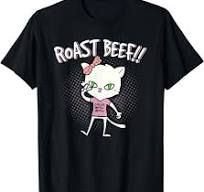Learn More about roast beef coochie

Welcome roast beef coochie to a candid conversation about an often misunderstood term – roast beef coochie. You may have heard this phrase thrown around casually, but do you really know what it means? Join us as we delve into the origins, myths, and misconceptions surrounding roast beef coochie, while also exploring essential tips for self-care and boosting confidence. Let’s break down barriers and embrace empowerment in our own skin!
What is Roast Beef Coochie?
Roast Beef Coochie is a slang term used to describe the appearance of a woman’s labia that may have darker or protruding skin folds. The term itself can be seen as derogatory and body-shaming, perpetuating harmful beauty standards and ideals. It often implies that there is something wrong with having a vulva that doesn’t fit conventional norms.
It’s crucial to understand that every person’s body is unique and beautiful in its own way. There is no one-size-fits-all definition of what is considered “normal” when it comes to genitalia. Embracing diversity and individuality is key to promoting self-love and acceptance.
Instead of focusing on outdated stereotypes or unrealistic expectations, let’s shift the narrative towards celebrating our bodies for all their differences and quirks. Roast Beef Coochie may be just a term, but the impact it has on self-esteem and confidence can be profound. Let’s strive for inclusivity and positivity in how we view ourselves and others.
The Origin of the Term
Have you ever wondered where the term “roast beef coochie” comes from? Let’s dive into its origins and uncover the story behind this unique expression.
The origin of the term can be traced back to urban slang, often used in a derogatory manner to describe the appearance of a woman’s genitalia. It gained popularity through social media and online forums, perpetuating harmful stereotypes about women’s bodies.
While some may use it casually or even as a joke, it’s essential to understand the impact of such language on body image and self-esteem. Words have power, and they can shape how we view ourselves and others.
It’s crucial to challenge societal norms and embrace diversity in all forms. Let’s strive for inclusivity and promote positivity when discussing sensitive topics like body image.
Myths and Misconceptions about Roast Beef Coochie
Have you ever heard the term “roast beef coochie” being thrown around in conversations or online? This slang term has unfortunately perpetuated myths and misconceptions about women’s bodies. One of the biggest myths is that vaginal appearance determines a woman’s worth, which couldn’t be further from the truth.
It’s essential to understand that every woman’s body is unique and normal – there is no one-size-fits-all when it comes to genitalia. Another misconception is that having labia minora that protrude means something negative, but in reality, it’s just part of natural human variation.
Let’s debunk these harmful myths and embrace the diversity of women’s bodies. It’s crucial to educate ourselves and others on what truly matters – self-love, confidence, and acceptance of our bodies as they are. Let’s celebrate our differences rather than letting outdated stereotypes dictate how we feel about ourselves.
How to Take Care of Your Vagina
Taking care of your vagina is essential for overall health and well-being. One way to maintain vaginal health is by practicing good hygiene. It’s important to wash the external genital area with mild soap and water, avoiding harsh chemicals that can disrupt the delicate balance of the vagina.
Another crucial aspect of caring for your vagina is staying hydrated. Drinking plenty of water helps to keep mucous membranes moist, including those in the vaginal area. Additionally, wearing breathable underwear made from natural fabrics like cotton can help prevent irritation and infections.
Regular visits to a gynecologist are key in monitoring your vaginal health. They can provide guidance on any concerns or changes you may experience. Practicing safe sex by using condoms can protect against sexually transmitted infections (STIs) that could affect your vaginal health.




